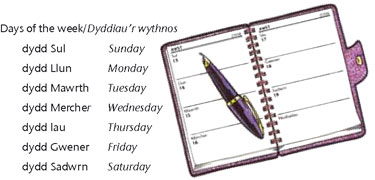2 Sesiwn 2
In this session you will learn about greetings and introductions, how to count from zero to ten and you will practise the days of the week.
Ymarfer 1
Read these phrases, then listen to them on the audio clip below and repeat. Note that the common greeting Sut mae? is pronounced shwmai in South Wales.
| Sut mae? | How are things/you? |
| Bore da | Good morning |
| Prynhawn da | Good afternoon |
| Noswaith dda | Good evening |
| Hwyl | Goodbye (informal) |
| Da boch chi | Goodbye (formal) |
Transcript: Audio 6
Ymarfer 2
Which greeting would you use at different times of day? Listen to audio track and respond appropriately.
Transcript: Audio 7
Ymarfer 3
This is how you introduce yourself. Listen to the audio clip and respond to the prompt.
Pwy dych chi? Who are you?
___ dw i. I'm ___.
Transcript: Audio 8
You may want to add the following:
Braf cwrdd â chi. Nice meeting you.
Ymarfer 4
Read the following words and phrases used for introductions. Then play the audio clip, listening to the examples and repeating them in the pause. Note that the common greeting Sut dych chi? is pronounced shwd ŷ chi in South Wales.
| Sut dych chi? | How are you? |
| Da iawn, diolch | Very well, thank you |
| Iawn | Fine |
| Go lew/Gweddol | OK/Not bad |
| Wedi blino | Tired |
| Ofnadwy | Terrible |
Transcript: Audio 9
Ymarfer 5
In response to the question Sut dych chi? write an appropriate response to match the symbols.

Answer
You should have written the following:
(a) da iawn (diolch)
(b) ofnadwy
(c) go lew/gweddol
(ch) wedi blino
Ymarfer 6
Now listen to the audio clip where you will hear questions asked of the following people. Give the reply they would offer.
a.John – tired
b.Elisabeth – very well, thanks
c.Tom – terrible
Transcript: Audio 10
Ymarfer 7
Read the numbers first and then say them aloud. Then play the audio clip, listening to the pronunciation and repeating after each number.
| 0 | dim |
| 1 | un |
| 2 | dau |
| 3 | tri |
| 4 | pedwar |
| 5 | pump |
| 6 | chwech |
| 7 | saith |
| 8 | wyth |
| 9 | naw |
| 10 | deg |
Transcript: Audio 11
Ymarfer 8
Listen to the numbers in the audio clip and say which number comes next.
Transcript: Audio 12
Ymarfer pellach
Here are some more ideas for number practice:
learn to say your own telephone number in Welsh
whenever you come across numbers during the day, try saying them in Welsh
practise counting down from 10 to 0.
Ymarfer 9
Now for some more practice. Say these sums aloud and answer them in Welsh. When you come across ‘+’, say a (and), and for ‘−’ say tynnu (take away).
(a) 3 + 5 =
(b) 9 − 4 =
(c) 3 + 4 − 7 =
(ch) 8 − 5 =
(d) 10 − 1 =
(dd) 3 + 7 =
(e) 4 + 6 − 8 =
Answer
How was your arithmetic? Did your sums go like this?
(a) tri + pump = wyth
(b) naw − pedwar = pump
(c) tri + pedwar − saith = dim
(ch) wyth − pump = tri
(d) deg − un = naw
(dd) tri + saith = deg
(e) pedwar + chwech − wyth = dau
Ymarfer 10
Look at the days of the week and find out what they are called in Welsh. Then listen to the audio clip and practise saying them.

Transcript: Audio 13
Now try to say the days of the week in order in Welsh, starting with Sunday. Use the jumbled list below to help you.

Ymarfer 11
Using the audio clip, listen to the prompts and say which day comes next.
Transcript: Audio 14
Ymarfer 12
Listen to the dialogue in the audio clip below and fill in the missing words.
Transcript: Audio 15
Answer
Here is the complete dialogue:
Ymarfer 13
Finally, test yourself on what you have learned in this session by listening to the English prompts in this audio clip and responding in Welsh.
